第52章 CHAPTER XIV(1)
Sir Willoughby and Laetitia "I prepare Miss Dale."
Sir Willoughby thought of his promise to Clara. He trifled awhile with young Crossjay, and then sent the boy flying, and wrapped himself in meditation. So shall you see standing many a statue of statesmen who have died in harness for their country.
In the hundred and fourth chapter of the thirteenth volume of the Book of Egoism it is written: Possession without obligation to the object possessed approaches felicity.
It is the rarest condition of ownership. For example: the possession of land is not without obligation both to the soil and the tax-collector; the possession of fine clothing is oppressed by obligation; gold, jewelry, works of art, enviable household furniture, are positive fetters; the possession of a wife we find surcharged with obligation. In all these cases possession is a gentle term for enslavement, bestowing the sort of felicity attained to by the helot drunk. You can have the joy, the pride, the intoxication of possession; you can have no free soul.
But there is one instance of possession, and that the most perfect, which leaves us free, under not a shadow of obligation, receiving ever, never giving. or if giving, giving only of our waste; as it were (sauf votre respect), by form of perspiration, radiation, if you like; unconscious poral bountifulness; and it is a beneficent process for the system. Our possession of an adoring female's worship is this instance.
The soft cherishable Parsee is hardly at any season other than prostrate. She craves nothing save that you continue in being--her sun: which is your firm constitutional endeavour: and thus you have a most exact alliance; she supplying spirit to your matter, while at the same time presenting matter to your spirit, verily a comfortable apposition. The Gods do bless it.
That they do so indeed is evident in the men they select for such a felicitous crown and aureole. Weak men would be rendered nervous by the flattery of a woman's worship; or they would be for returning it, at least partially, as though it could be bandied to and fro without emulgence of the poetry; or they would be pitiful, and quite spoil the thing. Some would be for transforming the beautiful solitary vestal flame by the first effort of the multiplication-table into your hearth-fire of slippered affection. So these men are not they whom the Gods have ever selected, but rather men of a pattern with themselves, very high and very solid men, who maintain the crown by holding divinely independent of the great emotion they have sown.
Even for them a pass of danger is ahead, as we shall see in our sample of one among the highest of them.
A clear approach to felicity had long been the portion of Sir Willoughby Patterne in his relations with Laetitia Dale. She belonged to him; he was quite unshackled by her. She was everything that is good in a parasite, nothing that is bad. His dedicated critic she was, reviewing him with a favour equal to perfect efficiency in her office; and whatever the world might say of him, to her the happy gentleman could constantly turn for his refreshing balsamic bath. She flew to the soul in him, pleasingly arousing sensations of that inhabitant; and he allowed her the right to fly, in the manner of kings, as we have heard, consenting to the privileges acted on by cats. These may not address their Majesties, but they may stare; nor will it be contested that the attentive circular eyes of the humble domestic creatures are an embellishment to Royal pomp and grandeur, such truly as should one day gain for them an inweaving and figurement--in the place of bees, ermine tufts, and their various present decorations--upon the august great robes back-flowing and foaming over the gaspy page-boys.
Further to quote from the same volume of The Book: There is pain in the surrendering of that we are fain to relinquish.
The idea is too exquisitely attenuate, as are those of the whole body-guard of the heart of Egoism, and will slip through you unless you shall have made a study of the gross of volumes of the first and second sections of The Book, and that will take you up to senility; or you must make a personal entry into the pages, perchance; or an escape out of them. There was once a venerable gentleman for whom a white hair grew on the cop of his nose, laughing at removals. He resigned himself to it in the end, and lastingly contemplated the apparition. It does not concern us what effect was produced on his countenance and his mind; enough that he saw a fine thing, but not so fine as the idea cited above; which has been between the two eyes of humanity ever since women were sought in marriage. With yonder old gentleman it may have been a ghostly hair or a disease of the optic nerves; but for us it is a real growth, and humanity might profitably imitate him in his patient speculation upon it.
Sir Willoughby Patterne, though ready in the pursuit of duty and policy (an oft-united couple) to cast Miss Dale away, had to consider that he was not simply, so to speak, casting her over a hedge, he was casting her for a man to catch her; and this was a much greater trial than it had been on the previous occasion, when she went over bump to the ground. In the arms of a husband, there was no knowing how soon she might forget her soul's fidelity. It had not hurt him to sketch the project of the conjunction; benevolence assisted him; but he winced and smarted on seeing it take shape. It sullied his idea of Laetitia.